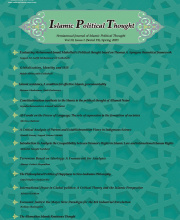
Islamic Political Thought
Islamic Political Thought, Vol.8, Issue.1 (Serial 15), Spring 2021 (مقاله علمی وزارت علوم)
مقالات
حوزه های تخصصی:
The victory of the Islamic Revolution of Iran at the end of the seventies was one of the important events and developments of the 20th century, whose occurrence surprised all theorists and political analysts. However, assessing the impacts’ dimensions of the Islamic Revolution on the international system was a matter that has still retained its significance from the first years of the victory of the revolution until now, i.e., almost three decades later, which has been an important topic of interest to writers and analysts in the region and around the world.This article is an attempt to evaluate and analyze these effects, through which, the author is trying to discuss the nature and extent of these effects by citing the existing references and evidence using the writings and literature published in this context.
Socio-cultural Policy to Manage Ethnical Diversity in the Islamic Republic of Iran(مقاله علمی وزارت علوم)
حوزه های تخصصی:
Socio-cultural diversity is a comprehensive phenomenon across the world so that there are only a few monoethnical countries. Every country attempts to plan its policy to manage its ethnical diversity on one hand according to goals and approaches of its political system and on the other hand according to its specific ethnical diversity pattern. The Islamic Republic of Iran also is among countries with ethnical diversity and attempts to administrate its policy according to its political system approach toward ethnical diversity and the features of that diversity. In this paper it was tried to represent some socio-cultural suggestions, employing the positive experiences of countries with ethnical diversity and regarding opportunity-based approach of the Islamic Republic of Iran toward ethnical diversity and recommendations of the leaders of the revolution. The research method used here is a combination of documentary method with studying of resources and available studies, formation of elites’ panel, interviewing with elites. Also Smith’s general policy making model was used in the process.
Arba'een, A Social Ritual in Civilizational Form: Civilizational Capacities and Sub-System(مقاله علمی وزارت علوم)
حوزه های تخصصی:
According to the Islamic discourse “rituals” are concepts related to obedience and submission to God’s commandments and attempting to honor the Islamic rituals. On the other side, Western sociologists such as Durkheim as the pioneers of social rituals concept try to represent a reductionist approach toward religion and limit it within symbolic rituals and give a minimal role to transfer values and create social solidarity. But the different nature of Islam in comparison to other religions indicates that the Western version is not suitable for the Islamic world, because Islam has its own serious role in the society, and the Islamic social rituals play a maximal role in transferring values and creating solidarity among Moslems. The Islamic social rituals and especially Arba'een is not limited to such rituals as related to identity, or ethnic, national and lingual rituals. In fact, it goes even higher than religious identity borders and represents a social ritual that encompasses different tribes, nations, and languages. The ritual of Arba'een creates civilizational subsystems the most important of which are as follows:Cooperative-based economy pattern, cultural and artistic civilization concept, modern social order, positive security, and civilizational identity.
Explaining the Concept of Justice from the Perspective of Ali Shariati(مقاله علمی وزارت علوم)
حوزه های تخصصی:
Ali Shariati (Ph.D.) is a thinker who has tried to describe and introduce Islam in the context of socialism with sociological approaches and utilizing historical data and minimal philosophical views. In this endeavor, justice was a central concept shaping the ideal society of Shariati, called the Middle Ummah (Middle Community). By manipulating conventional socialism, using its various modes, and also incorporating Islamic beliefs into its structure, he tried to use socialism as a context for introducing Islamic vision to build an ideal religious society. In this religious ideal society characterized to be a dual-rooted one named “Classless Monotheistic Society”, justice was the spirit governing it, which tuned it with the system of creation. On the path to build a theory of justice shaping a classless monotheistic society, Shariati passes through the four stages of theorizing; however, contradictions appear in the stages more elaborated by him and a great deal of ambiguity is also seen where he has chosen to give brief explanations. Thus, Shariati’s theory of justice is an incomplete theory containing many innate contradictions and ambiguities. The flaw in Shariati’s justice theory is so serious that the authors claim that what is inherited from Shariati is not a coherent theory of justice; rather, it is an initial design of a theory of justice in the context of Islamic socialism.
Security Strategies in the Syrah of the Shiite Infallible Imams(مقاله علمی وزارت علوم)
حوزه های تخصصی:
This paper seeks to study the security strategies in the Syrah (The life conduct) of the Shiite Infallible Imams. Since one of the most important Shiite sources in understanding the life of the Infallibles Imams are the four books of hadith regarded as reliable by the Shi'as (Al-Kutub al-Arbaʿa), so this study have been analyzed these books in terms of case study. The research question is as follows: What security strategies did the Infallibles Imams use during their Imamate and what are the features of these security strategies? The research method used in this study is content analysis. The results of this research show: According to their historical circumstances, the Infallibles Imams have used these four security strategies: Alavi, Expediency, Order Good and Forbid Evil and Taqiyya.
Imam Ali (AS): Manifestation of Freedom and Human Rights(مقاله علمی وزارت علوم)
حوزه های تخصصی: